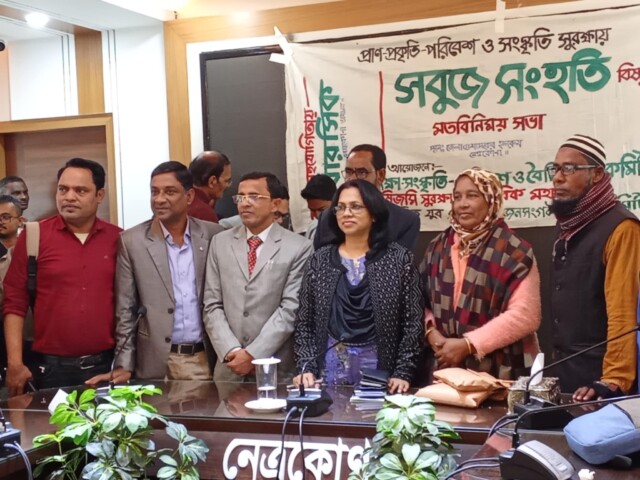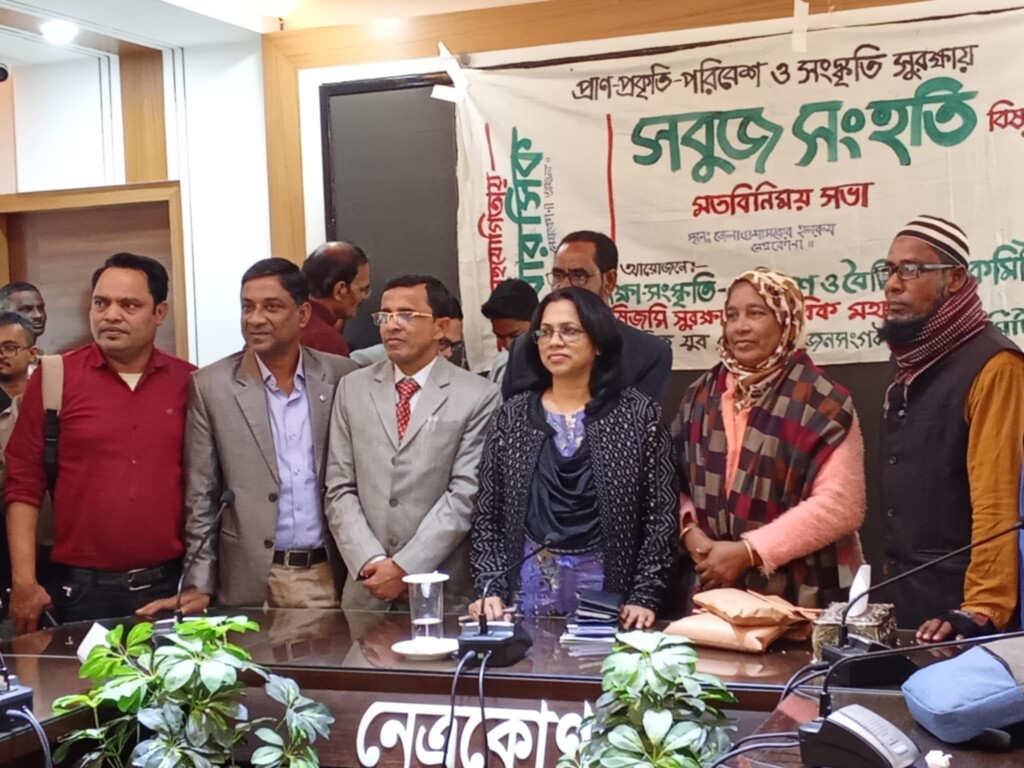By Md. Ohidur Rahman, from Netrokona
A discussion meeting titled “Green Solidarity for the Protection of Life, Nature, Environment, and Culture” was held at the conference hall of the Netrokona Deputy Commissioner’s office recently. The event was organized by the Education, Culture, Environment, and Diversity Protection Committee, Citizens’ Forum for Agricultural Land Protection, Netrokona United Youth Society, and the District People’s Organization Coordination Committee with the facilitation support of BARCIK.

The meeting was escorted by the presence of Ms. Banani Biswas, Deputy Commissioner and District Magistrate of Netrokona, as the chief guest. Other notable attendees included: Additional Deputy Commissioner (Revenue) Sukhmay Sarkar, Soil Research Center representative’s Mokhlesur Rahman, teacher Tanvir Hayat Khan, writer and researcher Purbhi Sammanita, journalist and poet Shyamolendu Pal, Head Teacher of Netrokona Collectorate School and President of the District Green Solidarity Committee Amlendu Sarkar and General Secretary of the Education, Culture, Environment, and Diversity Protection Committee Alpana Begum.
Additionally, representatives from the Netrokona District Green Solidarity Committee, Netrokona United Youth Society, Save Haor Movement, and Citizens’ Forum for Agricultural Land Protection, along with delegates from different upazilas, participated in the event.
The chief guest inaugurated the meeting by symbolically exchanging grains of traditional rice varieties, “Tulsimala” and “Binni.” A keynote presentation was delivered by Md. Ohidur Rahman, Regional Coordinator of BARCIK.
In her speech Ms. Banani Biswas said, “The words ‘life, nature, environment, and culture’ are deeply intertwined with our existence. We must preserve our local traditions and biodiversity. However, this cannot be achieved through individual efforts alone; we need collective action.”
The discussants highlighted the urgent need to protect the environment and ecosystem of the Netrokona region. They stated, “Uncontrolled encroachment on rivers and canals, air and noise pollution, water contamination, deforestation, and destruction of biodiversity have put the Netrokona region in a critical state. Joint efforts from farmers, fishermen, artisans, indigenous communities, and local people are essential to safeguard the natural and cultural heritage of the region.”

The following demands were raised during the meeting to protect the environment in the Netrokona region:
- Freeing the Mogra River from encroachment and conducting re-excavation.
- Abolishing the lease system in haors (wetlands).
- Planting native species of trees for the preservation of hills and wildlife.
- Excavating border streams.
- Conserving century-old trees.
- Establishing sanctuaries to protect fish in haors.
- Restoring rivers and canals in haor areas.
- Initiating measures to protect birds.
- Preserving topsoil to maintain soil health.
- Protecting urban ponds and playgrounds.
The meeting concluded with participants being served winter delicacies. The discussants expressed their commitment to creating a greener and culturally diverse Netrokona in the future.

